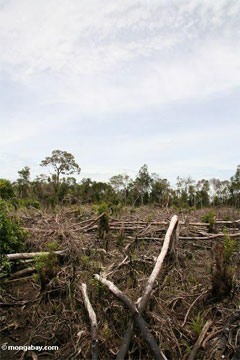Colonialism may have worsened slash-and-burn deforestation in Borneo according to a new study published by a researcher at the University of Missouri-Columbia.
Analyzing Dutch archival data, anthropologist Reed L. Wadley argues that displacement of the tribal Iban by European colonizers shifted their traditional use of slash-and-burn agriculture from secondary forest areas to primary forests, increasing the detrimental effects of their activities.
A release from the University of Missouri-Columbia explains.
-
Wadley said that slashing and burning old growth forests was safer and less time consuming for the Iban because the dense forest cover prevented the growth of many weeds, which had to be removed for good harvests. On the other hand, the weeding process was lengthy for swidden plots of secondary forest, and during the weeding period, men had to guard the women and children in the fields from possible attack by raiders. If old growth forest was slashed and burned, weeding time was greatly reduced. Immediately after European pacification expeditions, however, farmers also would cultivate plots without adequate fallow because they had no time to cut new fields, resulting in low yields and soil infertility.

Slash-and-burn agriculture in Kalimantan on the island of Borneo. Logging roads can open remote rainforest areas to colonists and developers who clear rainforest for subsistence agriculture and oil palm plantations. Photo by R. Butler. |
“For decades, swidden cultivation and tropical deforestation have been linked in national and international governmental discourse. Colonial and national governments have sought to outlaw it, while scientists have variously vilified, apologized for, and tried to contextualize swidden,” Wadley said. “My research argues that tropical agriculture is a historically contingent phenomenon, and farmers have always adjusted and responded to conditions in front of them, both positively and negatively.”
Wadley’s paper is published in the Journal of the Royal Anthropological Institute.
Related
Colonialism linked to orangutan extinction risk. A three year genetic study by wildlife geneticists from Cardiff School of Biosciences has shown a population collapse in the Bornean orang-utan. The population has declined up to one hundred fold since the late 19th Century, coinciding with the arrival of colonial powers on the island of Borneo and accelerated timber extraction. The research is among the first to link species decline with colonial deforestation, as opposed to when humans first appeared in the region.
Borneo. Borneo, the third largest island in the world, was once covered with dense rainforests. With swampy coastal areas fringed with mangrove forests and a mountainous interior, much of the terrain was virtually impassable and unexplored. Headhunters ruled the remote parts of the island until a century ago. In the 1980s and 1990s Borneo underwent a remarkable transition. Its forests were leveled at a rate unparallel in human history. Borneo’s rainforests went to industrialized countries like Japan and the United States in the form of garden furniture, paper pulp and chopsticks. Initially most of the timber was taken from the Malaysian part of the island in the northern states of Sabah and Sarawak. Later forests in the southern part of Borneo, an area belonging to Indonesia and known as Kalimantan, became the primary source for tropical timber. Today the forests of Borneo are but a shadow of those of legend and those that remain are highly threatened by the emerging biofuels market, specifically, oil palm.







